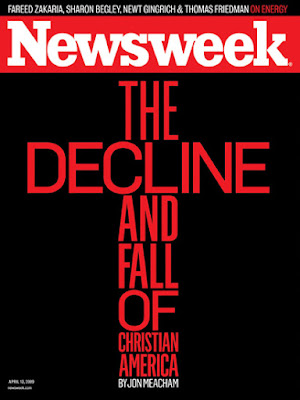With yesterday's post about Justice John Jay, first Chief Justice of the Supreme Court, I completed my series of important people in the founding of America. I chose this subject because I believe we have leaned so far in the direction of political "correctness" that we have rewritten our history. It seems fashionable to demean those men and women who are no longer here to defend themselves. People seem to delight in digging for any piece of dirt they can find and interpret it to mean that God and God-fearing men and women had no part in the founding of this nation. Horse feathers!
This nation is in itself a miracle. We won 2 wars against England that by all human calculations we should have lost. America's industrial might and brave men and women saved the world during 2 world wars just in the last century.
Alexis de Tocqueville in his landmark book, Democracy in America, wrote that all of the nations in Europe were caught up in dead religion, state religions both Protestant and Catholic that were something to do on holidays and even Sundays, but that had no part in the daily lives of the people and certainly not in their governments. America, he said, was vibrant. It's religious morality was carried into the daily lives of its people at all levels. My favorite quote is this: America is great because America is good. If she ever ceases to be good, she will cease to be great. I write about that greatness because I see my beloved country ceasing to be good.
 Several of the Founding Fathers stepped back from the organized religions of their day. Those men called themselves diests. History has wanted to portray them as atheists. That is a huge distortion of the truth! All believed in Jesus Christ. All believed in Christian principles and in the 10 Commandments. All of agreed that our Constitutional government could only succeed if America followed moral principles. Those who were diests chose that path because they could not believe in the concept of the trinity as taught in those days - three gods, one in substance. To be honest, I don't believe in the concept of the trinity as taught by most Christian churches even today.
Several of the Founding Fathers stepped back from the organized religions of their day. Those men called themselves diests. History has wanted to portray them as atheists. That is a huge distortion of the truth! All believed in Jesus Christ. All believed in Christian principles and in the 10 Commandments. All of agreed that our Constitutional government could only succeed if America followed moral principles. Those who were diests chose that path because they could not believe in the concept of the trinity as taught in those days - three gods, one in substance. To be honest, I don't believe in the concept of the trinity as taught by most Christian churches even today.  I believe in a Godhead united in purpose by separate in substance. There is nothing in the New Testament that describes three-gods-in-one-substance as most of Christianity believes, even today. As a Latter-day Saint I wonder if those Founding Fathers could have known what I know about the Godhead, if they would have believed. I think they may have.
I believe in a Godhead united in purpose by separate in substance. There is nothing in the New Testament that describes three-gods-in-one-substance as most of Christianity believes, even today. As a Latter-day Saint I wonder if those Founding Fathers could have known what I know about the Godhead, if they would have believed. I think they may have.As de Tocqueville once wrote, we can heal ourselves and our nation.
We just need to have the faith in God to do it. We need to:
- Believe in Jesus Christ
- Believe Jesus Christ
- Live by the example of Jesus Christ
- (i.e., love God and love and serve our neighbors as ourselves - what Christ considered to be the two greatest commandments.)
For if ye have done it unto the least of these, thy brethren, ye have done it unto me. (Jesus Christ - Matthew 24)










































